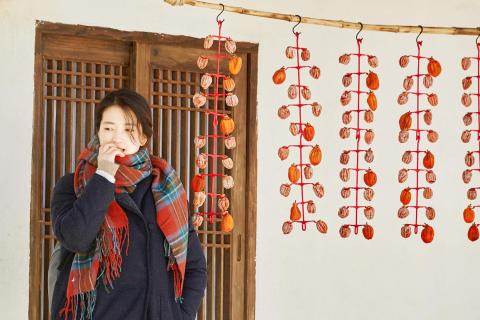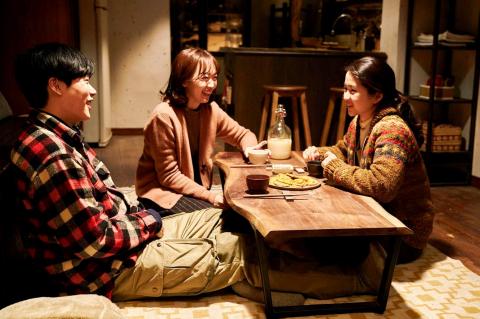In Little Forest, a young woman moves back to her childhood farming village in the countryside to escape the hardships and disappointments of city life. Even though it doesn’t offer any surprises, this slice-of-life drama by South Korean director Yim Soon-rye is an endearing and understated celebration of nature, food, friendship and family.
The film’s protagonist is Hye-won (Kim Tae-ri), a 20-something-year-old who aspires to be a teacher. She has just failed her teaching certification exam in Seoul, works a deadbeat part-time job at a convenience store and is on rocky terms with her boyfriend. Disenchanted and exhausted, she decides to return to her farming roots in the countryside, inhabiting her old, empty house which her mother (Moon So-ri) left behind after mysteriously vanishing years ago. Besides having a pet dog named Ogu for company, Hye-won reconnects with two childhood friends, fruits and vegetables farmer Jae-ha (Ryu Jun-yeol) and Eun-sook (Jin Ki-joo), who work in a nearby town as a bank teller.
Little Forest plays out in a slow, unhurried pace that beckons audiences to focus on the journey instead of the destination. It falls right into the mould of your typical, feel-good cinematic fare, but the film proves that a threadbare plot can still be effective with stellar execution. While the narrative mostly revolves around Hye-won re-adjusting to the country life, this is a small film with a very big heart, thanks to Yim’s meticulous direction and attention paid to the finest details.

Photo courtesy of Far East Film
Not only does the film’s four-act structure chronicle the changing of the seasons with vivid aesthetics, the climate transitions and growth of crops symbolically parallel Hye-won’s own year-long emotional renewal. In the opening scenes she begins rebuilding her life with uncertainty in a sparse, cold wintry environment; only in summer does she begin to reap the fruits of her labor with a plentiful harvest.
Audiences should be warned not to watch the film on an empty stomach — much of Little Forest is dedicated to attractive cooking scenes which demonstrate the redemptive power of homecooked comfort food. “I came back because I’m hungry,” quips Hye-won, lamenting how the instant convenience store meals in the city never filled her up.
Yim films these foodie scenes with tender, loving care: extended close-ups — including some Instagram-worthy flat lays — intricately detail the step-by-step process in preparing a spread of cuisines. Hye-won uses fresh ingredients from the natural environment to create Korean dishes such as kimchi sujebi (hand torn noodle soup) and makgeolli (rice wine), as well as edible plant items like fried acacia flower fritters.

Photo courtesy of Far East
It’s an assault of the senses all around: there’s something strangely therapeutic about watching (and listening to) Hye-won knead chewy dough, squelch rice grains in a bowl and delicately assemble layers of coloured flour to create a red bean steamed rice cake.
But far from being an indulgent display of food porn, cooking also serves as a conduit for our protagonist to revisit her past shared memories with her enigmatic mother, who passed down her boundless recipes and love for cooking to her. Veteran actress Moon as the absent matriarch appears in recurring flashbacks that offer glimpses of their sweet, bickering mother-daughter relationship, which also ultimately forms the emotional core of Little Forest.
Kim Tae-ri, who was last seen in political thriller 1987: When the Day Comes, is an absolute delight as the hardy, stubborn Hye-won determined to overcome the trials and tribulations in her life. Having a young actress carry an entire film is no mean feat, but Kim does it easily with her naturally likeable screen presence, managing to remain engaging onscreen even when she’s just shovelling snow off a driveway.
Popular actor Ryu Jun-yeol and newcomer Jin Ki-joo also deliver as her best friends, with the trio exuding winning chemistry as they squabble over jugs of milky-white makgeolli and candlelit bentos by the river.
“When things are hard, remember the scent of the sun, wind and rain,” muses Hye-won’s mother in a handwritten letter. With plenty of escapist appeal, Little Forest no doubt romanticizes the countryside as a rich, rural idyll where problems are easily solved, conveniently bypassing the share of difficulties faced by the farming community too.
Still, there’s something to be learned from the film’s humble appreciation of the simpler, tiny pleasures in life, be it staring out of a window listening to the sound of raindrops, fishing in the river bank in the dead of the night, or relishing the taste of dried persimmons in winter. It’s a much-needed reminder for all of us to stop and smell the roses every once in a while.

April 14 to April 20 In March 1947, Sising Katadrepan urged the government to drop the “high mountain people” (高山族) designation for Indigenous Taiwanese and refer to them as “Taiwan people” (台灣族). He considered the term derogatory, arguing that it made them sound like animals. The Taiwan Provincial Government agreed to stop using the term, stating that Indigenous Taiwanese suffered all sorts of discrimination and oppression under the Japanese and were forced to live in the mountains as outsiders to society. Now, under the new regime, they would be seen as equals, thus they should be henceforth

Last week, the the National Immigration Agency (NIA) told the legislature that more than 10,000 naturalized Taiwanese citizens from the People’s Republic of China (PRC) risked having their citizenship revoked if they failed to provide proof that they had renounced their Chinese household registration within the next three months. Renunciation is required under the Act Governing Relations Between the People of the Taiwan Area and the Mainland Area (臺灣地區與大陸地區人民關係條例), as amended in 2004, though it was only a legal requirement after 2000. Prior to that, it had been only an administrative requirement since the Nationality Act (國籍法) was established in

Three big changes have transformed the landscape of Taiwan’s local patronage factions: Increasing Democratic Progressive Party (DPP) involvement, rising new factions and the Chinese Nationalist Party’s (KMT) significantly weakened control. GREEN FACTIONS It is said that “south of the Zhuoshui River (濁水溪), there is no blue-green divide,” meaning that from Yunlin County south there is no difference between KMT and DPP politicians. This is not always true, but there is more than a grain of truth to it. Traditionally, DPP factions are viewed as national entities, with their primary function to secure plum positions in the party and government. This is not unusual

US President Donald Trump’s bid to take back control of the Panama Canal has put his counterpart Jose Raul Mulino in a difficult position and revived fears in the Central American country that US military bases will return. After Trump vowed to reclaim the interoceanic waterway from Chinese influence, US Defense Secretary Pete Hegseth signed an agreement with the Mulino administration last week for the US to deploy troops in areas adjacent to the canal. For more than two decades, after handing over control of the strategically vital waterway to Panama in 1999 and dismantling the bases that protected it, Washington has